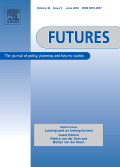
Futures
Scope & Guideline
Transforming Ideas into Tomorrow's Solutions
Introduction
Aims and Scopes
- Futures Studies and Scenario Planning:
The journal emphasizes the development and application of futures studies methodologies, including scenario planning, to facilitate understanding and preparation for potential future developments across social, environmental, and technological landscapes. - Sustainability and Environmental Futures:
Research published in 'Futures' often addresses sustainability challenges, exploring innovative solutions and pathways to achieve sustainable futures in various contexts, including urban planning, agriculture, and climate change mitigation. - Participatory Approaches and Community Engagement:
A significant focus is placed on participatory methodologies that involve stakeholders in the foresight process, enabling diverse voices to shape future narratives and enhance collective decision-making. - Interdisciplinary Perspectives:
The journal promotes interdisciplinary research that integrates insights from various fields such as sociology, economics, environmental science, and technology studies, fostering a holistic understanding of future challenges. - Ethics and Social Justice in Future Making:
'Futures' addresses ethical considerations and social justice issues related to future scenarios, advocating for inclusive and equitable approaches to future planning and decision-making.
Trending and Emerging
- Climate Resilience and Adaptation:
Recent publications increasingly focus on climate resilience strategies, emphasizing the need for adaptive approaches to mitigate the impacts of climate change on communities and ecosystems. - Social Justice and Equity in Futures Planning:
There is a growing trend towards integrating social justice and equity considerations into futures research, ensuring that diverse perspectives are included in the decision-making processes. - Technological Impact and Ethics:
Emerging discussions around the ethical implications of new technologies, such as artificial intelligence and biotechnology, are gaining traction, reflecting a critical examination of their societal impacts. - Decolonizing Futures Studies:
A notable increase in research aimed at decolonizing futures studies is evident, focusing on indigenous knowledge systems and alternative epistemologies to inform future narratives. - Urban Futures and Sustainable Development:
The journal is increasingly addressing urban futures, exploring sustainable urban development through innovative practices like participatory planning and nature-based solutions.
Declining or Waning
- Traditional Economic Growth Models:
There appears to be a decreasing emphasis on traditional economic growth paradigms, as the journal increasingly critiques such models in favor of sustainability and degrowth approaches. - Technological Determinism:
Research that uncritically embraces technological advancements without considering their societal implications is less frequently published, signaling a shift towards more nuanced discussions around technology's role in shaping futures. - Single-Disciplinary Approaches:
The journal has moved away from studies that isolate a single discipline in examining future scenarios, favoring interdisciplinary research that combines insights from multiple fields. - Futures of Conventional Energy Sources:
Papers focusing on the future of conventional energy sources like fossil fuels have declined, as the discourse increasingly centers around renewable energy and sustainable alternatives. - Short-term Projections without Contextual Analysis:
There is a noticeable reduction in studies that offer short-term projections without deep contextual analysis, as the journal encourages comprehensive explorations of complex systems over simplistic forecasts.
Similar Journals

Sustainable Futures
Innovating pathways to a resilient future.Sustainable Futures, published by ELSEVIER, is a pioneering open access journal dedicated to advancing research in the fields of technology management, operational science, sociology, and political science. Established in 2019, this esteemed journal has quickly positioned itself as a vital resource within the academic community, as evidenced by its impressive 2023 rankings, including Q1 status in Sociology and Political Science. With a focus on innovative and sustainable solutions for contemporary challenges, Sustainable Futures serves as an essential platform for researchers, professionals, and students seeking to explore the intersections between technology, society, and environmental change. The journal's commitment to open access since its inception enhances its global reach and accessibility, ensuring that high-quality research is available to all stakeholders. As the academic landscape continues to evolve, Sustainable Futures is poised to be a critical voice in shaping sustainable practices and innovations from 2019 to 2024 and beyond.

Global Sustainability
Fostering Insight for Environmental ProgressGlobal Sustainability, published by Cambridge University Press, serves as a pivotal platform for interdisciplinary research in the realms of sustainability, management, and environmental policy. Since its establishment as an Open Access journal in 2018, it has empowered researchers, professionals, and students by ensuring that high-quality research is widely accessible. With an impressive impact factor reflected in its Q1 category rankings in both Global and Planetary Change and Management, Monitoring, Policy and Law, this journal is at the forefront of advancing knowledge and strategies crucial for sustainable development. Operating from its headquarters in Cambridge, United Kingdom, this journal not only influences academic discourse but also plays a significant role in shaping public policy and practices towards a more sustainable world. Researchers are encouraged to submit innovative contributions as the journal continues to converge impactful scholarship from 2018 to 2024 and beyond.

Concentric-Literary and Cultural Studies
Elevating Scholarship in Literary and Cultural StudiesConcentric-Literary and Cultural Studies is a distinguished journal dedicated to advancing scholarship in the fields of literature and cultural studies. Published by the NATIONAL TAIWAN NORMAL UNIVERSITY, COLLEGE OF INTERNATIONAL STUDIES & SOCIAL SCIENCES, this journal offers a platform for researchers and academics to explore diverse topics that intersect literature and culture. With its ISSN 1729-6897 and E-ISSN 1729-8792, Concentric has been making significant contributions since its inception in 2012. Although presently listed in the Q4 quartile for both cultural studies and literature, the journal is committed to enhancing interdisciplinary dialogues and fostering innovative research approaches that push the boundaries of traditional scholarship. Residing in Taiwan, Concentric not only caters to local scholars but also reaches an international audience, providing access to critical perspectives and recent advancements in these pivotal fields. Aspiring to an impactful future, this journal continues to promote scholarly excellence and aims to ascend within academic rankings while engaging a robust community of researchers, professionals, and students.
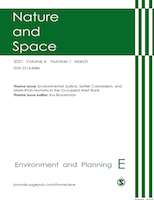
Environment and Planning E-Nature and Space
Innovating solutions for nature and space challenges.Environment and Planning E-Nature and Space is a prestigious journal published by SAGE Publications Inc, focusing on the critical intersection of environmental studies and spatial planning. With an impressive Impact Factor reflecting its academic influence and a Q1 quartile ranking in several categories including Development and Geography, Planning and Development, this journal serves as a vital resource for researchers, professionals, and students interested in contemporary issues surrounding nature, landscape conservation, and environmental policy. Spanning a converged period from 2018 to 2024, it publishes rigorously peer-reviewed articles that aim to advance knowledge and foster discussions on practices that influence our natural and developed environments. The journal's commitment to high-quality scholarship is further evidenced by its strong performance in Scopus rankings, standing within the top percentiles in its fields. Although it is not an open-access journal, the depth and relevance of its content make it an essential read for those dedicated to shaping sustainable futures.

Town and Regional Planning
Exploring the dynamics of urban development.Town and Regional Planning is a pivotal Open Access journal dedicated to advancing the fields of geography, urban studies, and regional planning. Published by the University of Free State, Department of Town & Regional Planning, this journal has been serving the academic community since 2010, ensuring that invaluable research is accessible to a global audience. With its ISSN 1012-280X and E-ISSN 2415-0495, the journal aims to foster innovative discussions and insights that address contemporary challenges in planning and policy-making within urban contexts, particularly in South Africa and surrounding regions. To highlight its credibility, as of 2023, Town and Regional Planning holds a Q3 quartile ranking in Geography, Planning and Development, and Urban Studies, alongside a Q4 ranking in Management, Monitoring, Policy and Law. This is complemented by its Scopus rankings, where it operates within the competitive landscapes of social sciences and environmental management. Researchers, professionals, and students are encouraged to explore articles that contribute to the development of sustainable and equitable urban environments.
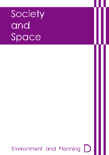
ENVIRONMENT AND PLANNING D-SOCIETY & SPACE
Pioneering research at the nexus of environment and society.Environment and Planning D: Society & Space is a prestigious journal published by SAGE Publications Ltd, focusing on the interdisciplinary intersection of environmental studies, urban planning, and social sciences. Since its inception in 1983, this journal has become a leading platform for groundbreaking research, evident by its distinguished Q1 rankings in both Environmental Science and Geography, Planning and Development categories. With an impressive Scopus rank placing it in the top 10% of related fields, it provides an invaluable resource for researchers, policymakers, and practitioners alike. The journal features high-quality articles that delve into contemporary issues like climate change, urban sustainability, and spatial dynamics, fostering a critical understanding of the socio-environmental challenges of our time. Although currently not offering open access, Environment and Planning D remains committed to advancing knowledge and inspiring innovative solutions for a sustainable future, drawing contributions from experts around the globe.
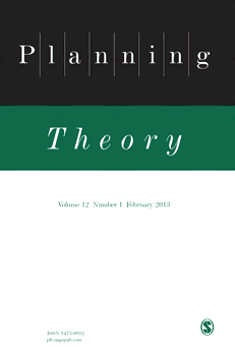
Planning Theory
Connecting Theory and Practice for Effective Urban SolutionsPlanning Theory is a premier scholarly journal published by SAGE Publications Inc, based in the United Kingdom. Established in 2002, this journal has quickly risen to prominence in the field of geography, planning, and development, achieving a notable Q1 quartile ranking in the 2023 category, alongside an impressive Scopus rank of #85 out of 821, placing it in the 89th percentile in its discipline. With a robust focus on innovative planning methodologies, theoretical discussions, and practical implications, Planning Theory serves as a vital platform for researchers, practitioners, and students alike, fostering discourse that shapes the future of urban and regional planning. While it operates under a subscription model, the journal's contribution to the academic community remains invaluable, providing critical insights into emerging trends and challenges in planning. As it converges toward 2024, the journal continues to champion the integration of theoretical and practical perspectives within the complex landscape of spatial planning.
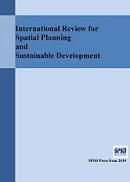
International Review for Spatial Planning and Sustainable Development
Innovating pathways to sustainable development.The International Review for Spatial Planning and Sustainable Development is a pivotal academic journal that addresses the critical intersection of spatial planning, sustainability, and environmental management. Published by INT COMMUNITY SPATIAL PLANNING & SUSTAINABLE DEVELOPMENT in Japan, the journal maintains a consistent publication record from 2013 to 2024, offering insightful research contributions and advanced discourse in its field. With its ISSN 2187-3666, it serves a wide readership, particularly within the fields of Geography, Planning and Development, Urban Studies, and Environmental Science, reflected in its strong Q2 and Q3 quartile rankings across several categories for 2023. The journal ranks #98 in Urban Studies and #353 in Geography, underscoring its relevance and impact within these disciplines. Researchers, professionals, and students are encouraged to contribute to and engage with this open access platform, fostering a rich exchange of ideas that support effective spatial planning and sustainable development practices globally.

Frontiers in Sustainable Cities
Championing Sustainability in Urban DevelopmentFrontiers in Sustainable Cities, published by FRONTIERS MEDIA SA, is an esteemed academic journal dedicated to advancing the fields of Urban Studies, Renewable Energy, and Public Administration. With a commitment to open access since 2019, the journal facilitates the dissemination of high-quality research aimed at creating sustainable urban environments. Operating from Lausanne, Switzerland, this influential publication supports knowledge exchange among researchers, professionals, and students involved in the complex dynamics of urban sustainability. The journal has achieved notable recognition, reflected in its quartile rankings—Q1 in Urban Studies and Q2 in both Public Administration and Renewable Energy, Sustainability and the Environment—indicating its relevance and impact within the scholarly community. Researchers benefit from a broad reach through its open access policy, enhancing visibility and accessibility of important findings that contribute to the development of sustainable cities globally.
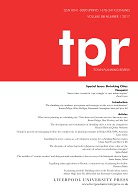
TOWN PLANNING REVIEW
Advancing Knowledge in Urban StudiesTOWN PLANNING REVIEW is a prestigious academic journal published by Liverpool University Press, focusing on pivotal research in the fields of urban studies and planning. Established in 1977, this journal has become a leading platform for the exploration of contemporary urban challenges and innovative planning solutions, aligning with its impressive Q1 rankings in both Geography, Planning and Development and Urban Studies. With a Scopus rank of 73 out of 279 in Urban Studies, it holds a strong presence in the academic community, making significant contributions to the scholarship and practice of town planning. Although it is not an open-access journal, it continues to reach a global audience by disseminating high-quality, peer-reviewed research. Researchers, professionals, and students interested in advancing their understanding of urbanization processes, planning methodologies, and policy implications will find TOWN PLANNING REVIEW an invaluable resource as it bridges theoretical insights and practical applications in the dynamic landscape of urban development.